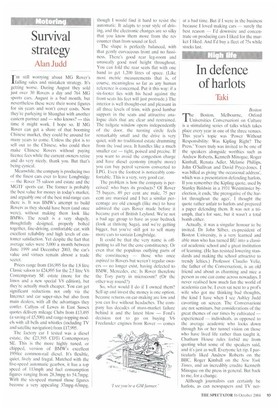Survival strategy
Alan Judd
I'm still worrying about MG Rover's falling sales and mistaken strategy. It's getting worse. During August they sold just over 30 Rovers a day and 764 MG sports cars. August is a had month, but nevertheless these were their worst figures for six years and won't cover costs. Now they're parleying in Shanghai with another eastern partner and — who knows? — this time it might work. I hope so. If MG Rover can get a share of that booming Chinese market, they could be around for many years to come. Unless the plot is to sell out to the Chinese, who could then make Chinese Rovers without paying licence fees while the current owners retire and do very nicely, thank you. But that's being cynical.
Meanwhile, the company is producing two of the finest cars ever to leave Longbridge — the Rover 75 saloon and estate and the MGTF sports car. The former is probably the best value for money in today's market, and arguably one of the best mid-range cars there is. It was BMW's attempt to build Rovers as they should have been (and once were), without making them look like BMWs. The result is a very shapely, thoughtfully designed, properly bolted together, fine-driving, comfortable car, with excellent reliability and high levels of customer satisfaction. Yet despite the fact that average sales were 5,000 a month between June 1999 and December 2003, the car's value and virtues remain almost a trade secret.
Prices range from £16,995 for the 1.8 litre Classic saloon to £24,895 for the 2.5 litre V6 Contemporary SE estate (more for the limos and a new special V8 edition), but they're actually much cheaper. You can get significant reductions not only via the Internet and car super-sites hut also from main dealers, with all the advantages they confer. Catlyns of Lewes in East Sussex quotes delivery mileage Clubs from £13,495 (a saving of £5,500) and range-topping models with all bells and whistles (including TV and satellite navigation) from £17,995.
The factory' ear I tested was a diesel estate, the £23,395 CDTi Contemporary SE. This is the more highly tuned, or chipped, version of BMW's excellent 1950cc common-rail diesel. It's flexible, quiet, lively and frugal. Matched with the five-speed automatic gearbox, it has a top speed of 113mph and fuel consumption figures ranging from 28.3mpg to 54.7mpg. With the six-speed manual those figures become a very appealing 37mpg-63mpg, though I would find it hard to resist the automatic. It adapts to your style of driving, and the electronic changes are so silky that you know them more from the rev counter than from sound or feel.
The shape is perfectly balanced, with that gently curvaceous front and no fussiness. There's good rear leg-room and unusually good roof height throughout. You can fold the rear seats flat with one hand to get 1,200 litres of space. (Like most metric measurements that is, of course, meaningless so far as any human reference is concerned. Put it this way: if a six-footer lies with his head against the front seats his feet will just protrude.) The interior is well thought-out and pleasant in all three levels of trim, with good lumbar support in the seats and attractive analogue dials that are clear and restrained. The tailgate window opens independently of the door, the turning circle feels remarkably small and the drive is very quiet, with no traditional estate drumming from the load area. It handles like a much smaller car — tight, poised and precise. If you want to avoid the congestion charge and have diesel economy (maybe more) you cart buy petrol versions converted to LPG. Even the footrest is noticeably comfortable. This is a very, very good car.
The problem is how the company is perceived: who buys its products? Of Rover 75 buyers, 89 per cent are male, 75 per cent are married and I bet a similar percentage are old enough (like me) to have admired the cars Rover made before it became part of British Leyland. We're not a bad age group to have as your bedrock (look at thriving Saga), and we're getting bigger, but you've still got to sell many more ears to sustain Longbridge.
It could be that the very name is offputting to all but the core constituency. Or even that the populous outlying parts of the constituency — those who once aspired to Rovers but weren't regular owners — no longer exist, having defected to BMW, Mercedes, etc. Is Rover therefore the Tory party in microcosm? (Or the other way round?) So, what would I do if I owned them? Sell up and invest the money is one option, because returns on car-making are low and you can live without headaches. The company has decades of mass-market failure behind it and the latest blow — Ford's decision not to go on buying V6 Free!ander engines from Rover — comes
at a bad time. But if I were in the business because I loved making cars — surely the best reason I'd downsize and concentrate on producing cars I liked for the market I liked. And I'd buy a fleet of 75s while stocks last.










































































































 Previous page
Previous page